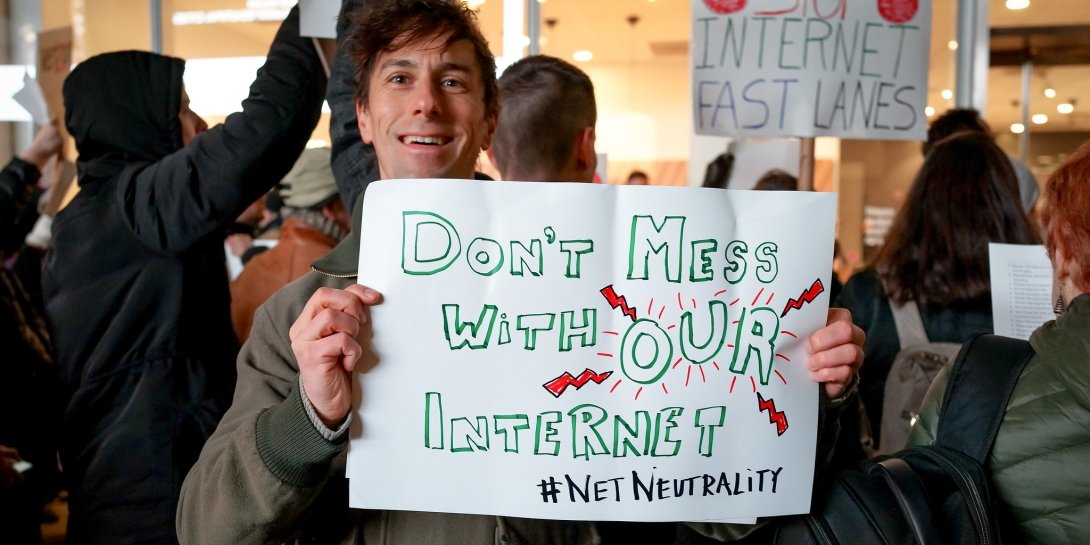In Court, Free Press and Open-Internet Allies Will Defend the FCC’s Authority to Protect Internet Users

Net Neutrality advocates protesting outside a NYC Verizon store.
Timothy Karr
CINCINNATI — On Thursday, Free Press and several allied organizations will argue before the U.S. Court of Appeals for the 6th Circuit in defense of the FCC’s April 2024 order upholding the agency’s power to safeguard internet users and protect the open internet.
Industry groups representing companies like AT&T, Comcast and Verizon are suing to repeal these Net Neutrality rules, which the Biden FCC restored, and to overturn the agency’s authority over broadband-internet access under Title II of the Communications Act. Title II empowers the FCC to hold powerful telecommunications companies accountable for providing resilient and reliable broadband service on just, reasonable and nondiscriminatory terms to internet users across the United States.
Free Press intervened in the case, along with the Benton Institute for Broadband & Society, the National Association of Regulatory Utility Commissioners, New America’s Open Technology Institute and Public Knowledge. In our brief, we explained that Title II authority empowers the FCC to stop ISPs from interfering with or discriminating against certain types of internet traffic. Concerns about these kinds of industry disruptions are well-established. The FCC has found for decades that broadband providers have the incentive and capability to interfere with their customers’ access to the internet.
During our portion of today’s oral arguments, the attorney representing Free Press and its allies will defend the legality of the FCC order despite a recent Supreme Court decision reversing Chevron deference and the increased prominence of the so-called major-questions doctrine.
Free Press Policy Counsel Yanni Chen said:
“It would be unthinkable to imagine that the FCC has virtually no power to protect and promote access to the nation’s most essential communications infrastructure. Despite industry lobbyists’ tired claims to the contrary, the agency does indeed have the authority Congress granted it in Title II of the Communications Act to step in if internet service providers treat their customers unjustly and unreasonably.
“The FCC can win this court battle over Net Neutrality without relying on Chevron deference. The FCC’s April open internet order correctly states that Title II is the right classification for broadband-internet access services under the laws that Congress wrote. This is true from a technical standpoint — and from a common-sense, pro-consumer perspective too.
“Even though the agency can’t rely on the deference to its interpretation of the Communications Act that governed previous rounds of this case, the court should come to the same conclusion as the FCC that internet access is best classified as a telecommunications service. Several judges and justices — including the late Supreme Court Justice Antonin Scalia — have recognized over the years just how logical it is to treat internet access as a telecom service under the statutory definition for Title II.
“The FCC’s April decision restored important nondiscrimination protections and legal frameworks that the Trump administration had abandoned. Upholding this decision will allow the FCC to continue to work toward ensuring that everyone in the United States — no matter their location, race or income — has affordable, reliable and safe internet connections free from discrimination or other manipulation by powerful phone and cable companies. We are hopeful that today’s panel of judges will see through the deceitful industry arguments about how Title II supposedly harms these giant companies — as well as the industry’s bad arguments about the agency’s authority to classify broadband providers properly under the Communications Act.
“Lobbyists working for the likes of AT&T, Comcast and Verizon will continue to argue, without proof, that the Trump-era repeal somehow spurred broadband deployment and speed increases while the rules’ presence allegedly impairs such upgrades. This is nonsense, as Free Press has shown time and time again by examining the companies’ own financial statements and investor briefings. In court today we look to correct the industry’s cherry-picked and inaccurate representations of history.
“Industry petitioners will also claim that this classification is a major question that the FCC cannot decide. Our brief filed in September explains in painstaking detail how the ISPs are wrong about the history of FCC regulation in this area, and wrong about the major-questions doctrine in every respect.
“We’re confident in our case, even in light of the Supreme Court’s recent administrative-law decisions. That’s because Congress gave the FCC the authority to make classification decisions like the one at issue here, and this agency followed the law and classified broadband as a telecommunications service.”